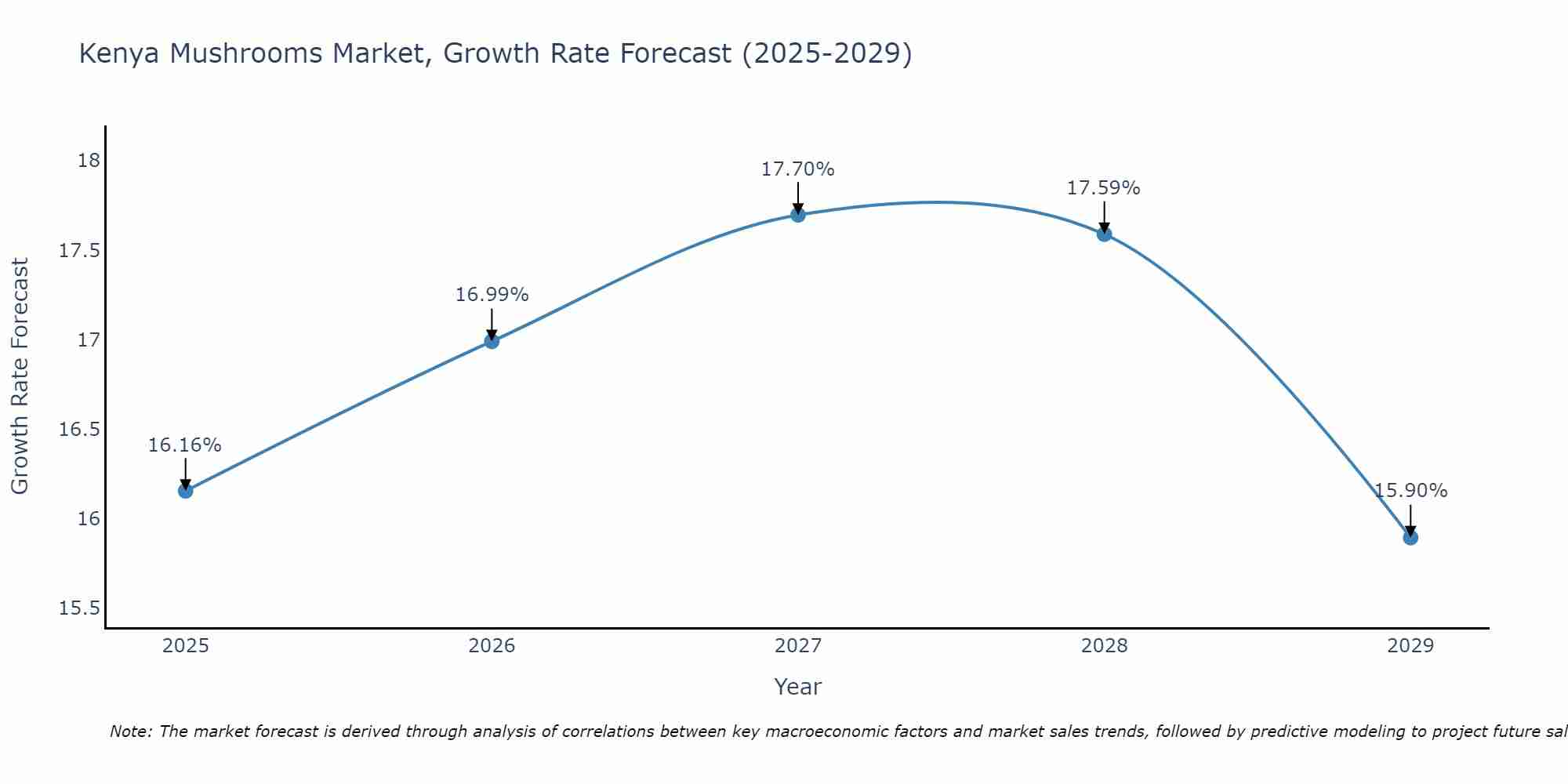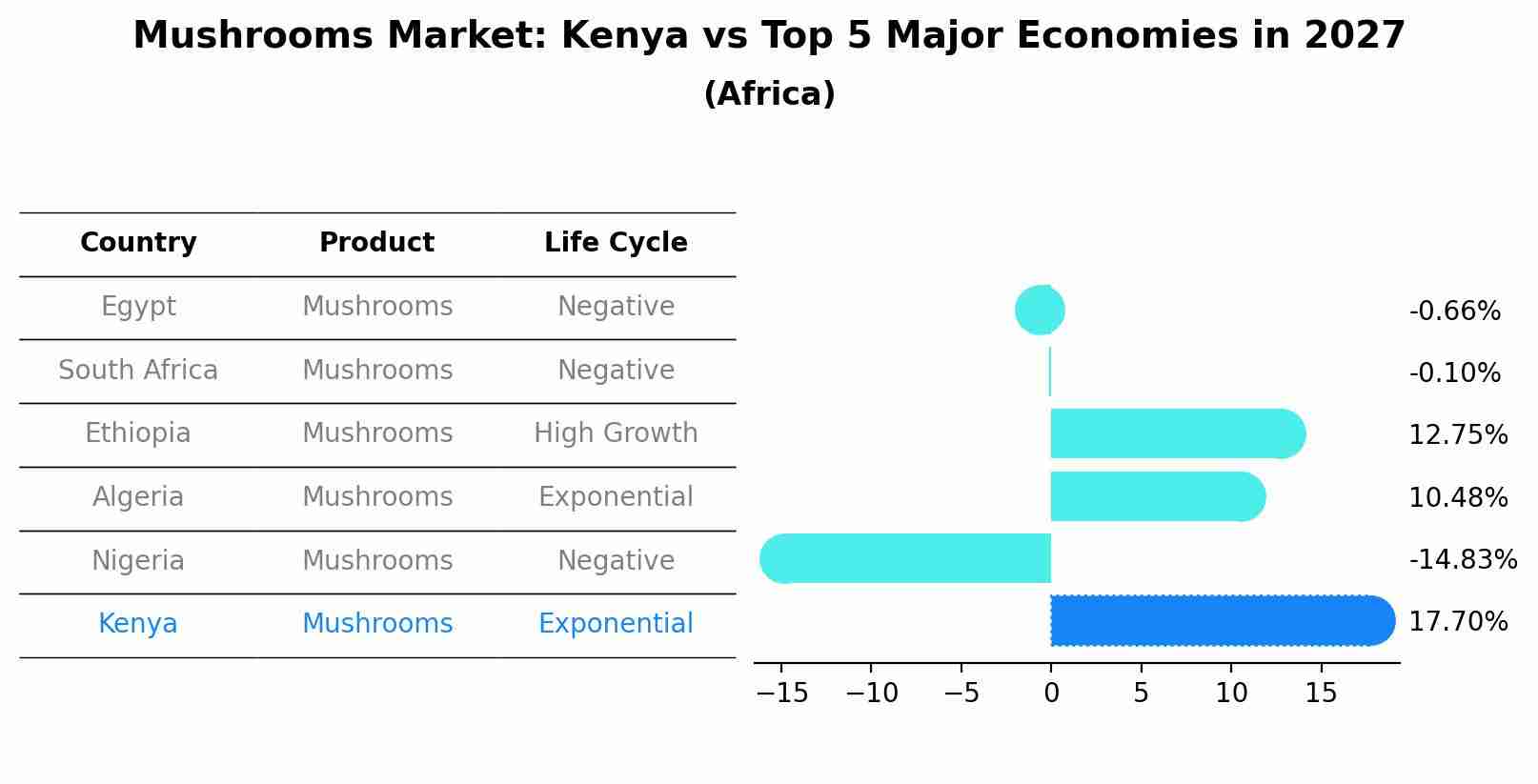Kenya Mushrooms Market (2025-2031) Outlook | Forecast, Industry, Size, Analysis, Share, Companies, Value, Trends, Growth & Revenue
| Product Code: ETC383210 | Publication Date: Aug 2022 | Updated Date: Jul 2025 | Product Type: Market Research Report | |
| Publisher: 6Wresearch | Author: Dhaval Chaurasia | No. of Pages: 75 | No. of Figures: 35 | No. of Tables: 20 |
Kenya Mushrooms Market Size Growth Rate
The Kenya Mushrooms Market is projected to witness mixed growth rate patterns during 2025 to 2029. Starting at 16.16% in 2025, the market peaks at 17.70% in 2027, and settles at 15.90% by 2029.

Mushrooms Market: Kenya vs Top 5 Major Economies in 2027 (Africa)
Kenya's Mushrooms market is anticipated to experience a exponential growth rate of 17.70% by 2027, reflecting trends observed in the largest economy Egypt, followed by South Africa, Ethiopia, Algeria and Nigeria.

Kenya Mushrooms Market Synopsis
The Kenya mushrooms market is witnessing significant growth driven by increasing consumer awareness of the health benefits of mushrooms. The market is characterized by a growing demand for both cultivated and wild mushrooms due to their nutritional value and versatile culinary applications. Key players in the industry are focusing on expanding production capacity and enhancing distribution channels to meet the rising demand. Additionally, the market is benefiting from favorable government initiatives supporting mushroom farming as a sustainable agricultural practice. With a growing number of consumers incorporating mushrooms into their diet for their health benefits, the Kenya mushrooms market is expected to continue its positive trajectory in the upcoming years.
Kenya Mushrooms Market Trends
In the Kenya mushrooms market, there is a growing trend towards increased consumption of exotic and specialty mushrooms such as oyster, shiitake, and lion`s mane varieties. Consumers are becoming more health-conscious and are seeking out mushrooms known for their nutritional benefits and unique flavors. Additionally, there is a rising interest in locally sourced and organic mushrooms, driven by a preference for sustainable and environmentally friendly food choices. The market is also witnessing a surge in innovative mushroom-based products, including mushroom powders, snacks, and supplements. As the awareness of the health benefits and culinary versatility of mushrooms continues to rise, the Kenya mushrooms market is expected to experience steady growth and diversification in the coming years.
Kenya Mushrooms Market Challenges
In the Kenya mushrooms market, some challenges include limited awareness and understanding of the nutritional benefits of mushrooms among consumers, resulting in relatively low consumption levels compared to other vegetables. Additionally, there are issues with inconsistent quality and supply chain inefficiencies, leading to difficulties in meeting market demand consistently. Lack of standardized grading systems and quality control measures also pose challenges in ensuring product quality and market competitiveness. Furthermore, the sector faces constraints related to access to finance, technology, and skilled labor, hindering the growth and development of mushroom cultivation businesses in Kenya. Overcoming these challenges will require targeted efforts to educate consumers, improve production practices, enhance supply chain management, and provide support to mushroom farmers through capacity building initiatives.
Kenya Mushrooms Market Investment Opportunities
Investment opportunities in the Kenya mushrooms market include the cultivation and processing of various mushroom varieties to meet the growing demand for exotic and nutritious fungi. With an increasing focus on healthy eating and sustainable food sources, there is a rising demand for mushrooms in Kenya. Investors can explore opportunities in setting up mushroom farms, investing in research and development for new mushroom strains, establishing processing facilities for value-added mushroom products such as powders or extracts, or even venturing into the export market for Kenyan mushrooms. Additionally, there is potential for vertical integration within the supply chain, from cultivation to distribution, to capture more value. Overall, the Kenya mushrooms market offers promising investment prospects driven by changing consumer preferences and the growing awareness of the health benefits of mushrooms.
Jordan Agar Market Government Policies
The Kenyan government has implemented various policies to support and regulate the mushrooms market in the country. These policies include the establishment of the Kenya National Mushroom Development Committee to oversee the industry`s growth and development. Additionally, the government provides training and technical support to mushroom farmers to enhance production and quality standards. Importantly, there are regulations in place to ensure food safety and quality control in the mushroom market. The government also encourages research and development in mushroom cultivation techniques to promote innovation and efficiency in the sector. Overall, these policies aim to stimulate growth, ensure quality, and promote sustainability in the Kenya mushrooms market.
Kenya Mushrooms Market Future Outlook
The Kenya Mushrooms Market is poised for significant growth in the coming years due to increasing consumer awareness of the health benefits of mushrooms, rising demand for plant-based protein sources, and a growing interest in exotic and specialty mushrooms. The market is expected to expand further as more farmers venture into mushroom cultivation, leveraging the country`s conducive climate and suitable growing conditions. Additionally, the government`s support for agricultural diversification and initiatives to promote mushroom farming will contribute to the market`s development. With a rising middle class population and changing dietary preferences towards healthier and sustainable food options, the Kenya Mushrooms Market is likely to witness a steady increase in consumption and production, presenting opportunities for both domestic consumption and export potential.
Key Highlights of the Report:
- Kenya Mushrooms Market Outlook
- Market Size of Kenya Mushrooms Market, 2024
- Forecast of Kenya Mushrooms Market, 2031
- Historical Data and Forecast of Kenya Mushrooms Revenues & Volume for the Period 2021 - 2031
- Kenya Mushrooms Market Trend Evolution
- Kenya Mushrooms Market Drivers and Challenges
- Kenya Mushrooms Price Trends
- Kenya Mushrooms Porter's Five Forces
- Kenya Mushrooms Industry Life Cycle
- Historical Data and Forecast of Kenya Mushrooms Market Revenues & Volume By Product for the Period 2021 - 2031
- Historical Data and Forecast of Kenya Mushrooms Market Revenues & Volume By Button for the Period 2021 - 2031
- Historical Data and Forecast of Kenya Mushrooms Market Revenues & Volume By Shiitake for the Period 2021 - 2031
- Historical Data and Forecast of Kenya Mushrooms Market Revenues & Volume By Oyster for the Period 2021 - 2031
- Historical Data and Forecast of Kenya Mushrooms Market Revenues & Volume By Matsutake for the Period 2021 - 2031
- Historical Data and Forecast of Kenya Mushrooms Market Revenues & Volume By Truffles for the Period 2021 - 2031
- Historical Data and Forecast of Kenya Mushrooms Market Revenues & Volume By Other for the Period 2021 - 2031
- Historical Data and Forecast of Kenya Mushrooms Market Revenues & Volume By Form for the Period 2021 - 2031
- Historical Data and Forecast of Kenya Mushrooms Market Revenues & Volume By Fresh for the Period 2021 - 2031
- Historical Data and Forecast of Kenya Mushrooms Market Revenues & Volume By Processed for the Period 2021 - 2031
- Historical Data and Forecast of Kenya Mushrooms Market Revenues & Volume By Distribution Channel for the Period 2021 - 2031
- Historical Data and Forecast of Kenya Mushrooms Market Revenues & Volume By Direct to Customer for the Period 2021 - 2031
- Historical Data and Forecast of Kenya Mushrooms Market Revenues & Volume By Grocery Stores for the Period 2021 - 2031
- Historical Data and Forecast of Kenya Mushrooms Market Revenues & Volume By Supermarkets & Hypermarkets for the Period 2021 - 2031
- Historical Data and Forecast of Kenya Mushrooms Market Revenues & Volume By Convenience Stores for the Period 2021 - 2031
- Historical Data and Forecast of Kenya Mushrooms Market Revenues & Volume By Online Stores for the Period 2021 - 2031
- Historical Data and Forecast of Kenya Mushrooms Market Revenues & Volume By Application for the Period 2021 - 2031
- Historical Data and Forecast of Kenya Mushrooms Market Revenues & Volume By Food for the Period 2021 - 2031
- Historical Data and Forecast of Kenya Mushrooms Market Revenues & Volume By Pharmaceutical for the Period 2021 - 2031
- Historical Data and Forecast of Kenya Mushrooms Market Revenues & Volume By Cosmetics for the Period 2021 - 2031
- Kenya Mushrooms Import Export Trade Statistics
- Market Opportunity Assessment By Product
- Market Opportunity Assessment By Form
- Market Opportunity Assessment By Distribution Channel
- Market Opportunity Assessment By Application
- Kenya Mushrooms Top Companies Market Share
- Kenya Mushrooms Competitive Benchmarking By Technical and Operational Parameters
- Kenya Mushrooms Company Profiles
- Kenya Mushrooms Key Strategic Recommendations
Frequently Asked Questions About the Market Study (FAQs):
- Single User License$ 1,995
- Department License$ 2,400
- Site License$ 3,120
- Global License$ 3,795
Search
Thought Leadership and Analyst Meet
Our Clients
Related Reports
- Afghanistan Rocking Chairs And Adirondack Chairs Market (2026-2032) | Size & Revenue, Competitive Landscape, Share, Segmentation, Industry, Value, Outlook, Analysis, Trends, Growth, Forecast, Companies
- Afghanistan Apparel Market (2026-2032) | Growth, Outlook, Industry, Segmentation, Forecast, Size, Companies, Trends, Value, Share, Analysis & Revenue
- Canada Oil and Gas Market (2026-2032) | Share, Segmentation, Value, Industry, Trends, Forecast, Analysis, Size & Revenue, Growth, Competitive Landscape, Outlook, Companies
- Germany Breakfast Food Market (2026-2032) | Industry, Share, Growth, Size, Companies, Value, Analysis, Revenue, Trends, Forecast & Outlook
- Australia Briquette Market (2025-2031) | Growth, Size, Revenue, Forecast, Analysis, Trends, Value, Share, Industry & Companies
- Vietnam System Integrator Market (2025-2031) | Size, Companies, Analysis, Industry, Value, Forecast, Growth, Trends, Revenue & Share
- ASEAN and Thailand Brain Health Supplements Market (2025-2031) | Strategy, Consumer Insights, Analysis, Investment Trends, Opportunities, Growth, Size, Share, Industry, Revenue, Segments, Value, Segmentation, Supply, Forecast, Restraints, Outlook, Competition, Drivers, Trends, Demand, Pricing Analysis, Competitive, Strategic Insights, Companies, Challenges
- ASEAN Bearings Market (2025-2031) | Strategy, Consumer Insights, Analysis, Investment Trends, Opportunities, Growth, Size, Share, Industry, Revenue, Segments, Value, Segmentation, Supply, Forecast, Restraints, Outlook, Competition, Drivers, Trends, Demand, Pricing Analysis, Competitive, Strategic Insights, Companies, Challenges
- Europe Flooring Market (2025-2031) | Outlook, Share, Industry, Trends, Forecast, Companies, Revenue, Size, Analysis, Growth & Value
- Saudi Arabia Manlift Market (2025-2031) | Outlook, Size, Growth, Trends, Companies, Industry, Revenue, Value, Share, Forecast & Analysis
Industry Events and Analyst Meet
Whitepaper
- Middle East & Africa Commercial Security Market Click here to view more.
- Middle East & Africa Fire Safety Systems & Equipment Market Click here to view more.
- GCC Drone Market Click here to view more.
- Middle East Lighting Fixture Market Click here to view more.
- GCC Physical & Perimeter Security Market Click here to view more.
6WResearch In News
- Doha a strategic location for EV manufacturing hub: IPA Qatar
- Demand for luxury TVs surging in the GCC, says Samsung
- Empowering Growth: The Thriving Journey of Bangladesh’s Cable Industry
- Demand for luxury TVs surging in the GCC, says Samsung
- Video call with a traditional healer? Once unthinkable, it’s now common in South Africa
- Intelligent Buildings To Smooth GCC’s Path To Net Zero


















